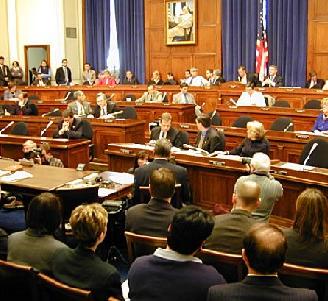 Last week we saw the Waxman Markey bill go to the Energy and Commerce committee. Watching the markup process increased my interest in the role special interest money plays in the political process.
Last week we saw the Waxman Markey bill go to the Energy and Commerce committee. Watching the markup process increased my interest in the role special interest money plays in the political process.
The House Committee on Energy and Commerce is responsible for oversight in legislation concerning: telecommunications, energy, international commerce, public health, consumer protection and much more. The Energy Department, Health and Human Services, the Transportation Department to the Federal Trade Commission, Food and Drug Administration, and Federal Communications Commission all fall under this committee’s jurisdiction.
Being that this is the committee that was given the responsibility of approving the Waxman Markey bill (the legislation that will determine our future energy policy); I was particularly interested in the amount of influence the energy industry had on shaping these positions of its members. The only way I could actually come close to measuring this is by looking at how much energy companies contribute to these candidates and how much their votes reflect the contributions they receive. As a control for this highly informal quasi-experiment I compared the contributions Energy and Commerce Committee members received from the energy industry the amount of contributions members of the Ways and Means Committee (which deals with taxation and welfare) received from the same industries. I limited this to congressmen who received $10,000 or more in contributions from energy companies during the 2008 election cycle.
I found that in the 65.52% of energy and commerce committee members received energy contributions above $10,000, while 58.53% of Ways and Means members received contributions above $10,000, during the 2008 campaign season. On average Energy and Commerce members received $53,972, while Ways and Means members only received $35,986, on average. The biggest recipients of both parties on the Energy and Commerce Committee got substantially more than their counterparts on Ways and Means Committee. In fact the biggest recipient on Energy and Commerce got $267,559 more than the largest recipient in Ways and Means. The Democrats in both committees received fewer contributions from these industries than the republicans, but the biggest recipient among Energy and Commerce Democrats, Louisiana’s Charlie Melancon, received $40,176 more than Charles Rangel the biggest Democrat recipient on the Ways and Means committee. It should be noted that a bigger percentage of Republicans on both committees received contributions above $10,000 in Energy Contributions. 100% of Republicans on Energy and Commerce received $10,000 or more while only 44% of Democrats did.
So how effective were these contributions at swaying the representatives? It is difficult to say to say because the deliberations took place behind close doors. Many of the representatives who voted for the final version of the bill may have attempted to weaken some of its environmental protections or add favors for their favorite industries during the deliberations — we can’t know for sure. We can, however, see how the different representatives voted.
Any bill that improves pollution standards or requires businesses to switch to cleaner or more efficient energy sources is likely to get shot down by the Republicans. This was the case here, with all Republicans but Mary Bono Mac, of California, voting against the bill. It should be noted that her $60,000 thousand in energy contributions put her well below the average ($102,654.50) for Republicans on the Energy and Commerce Committee (though there were 9 with lower contributions).
The Democrats votes were a little more telling. Three biggest Democrat recipients voted against Waxman Markey, while Gene Green, of Texas, and John Dingle of Michigan, received the fourth and fifth largest amounts of energy contributions and still supported the bill.
I suspect campaign contributions help create a positive feed back cycle. Contributors give to candidates that support their interest initially, and the contributions increase this support. This increased support leads to further special interest contributions and further loyalty to this lobby. Unfortunately this cycle of political indebtedness is at odds with the public interest and gives special interest groups too much power over our politicians.


